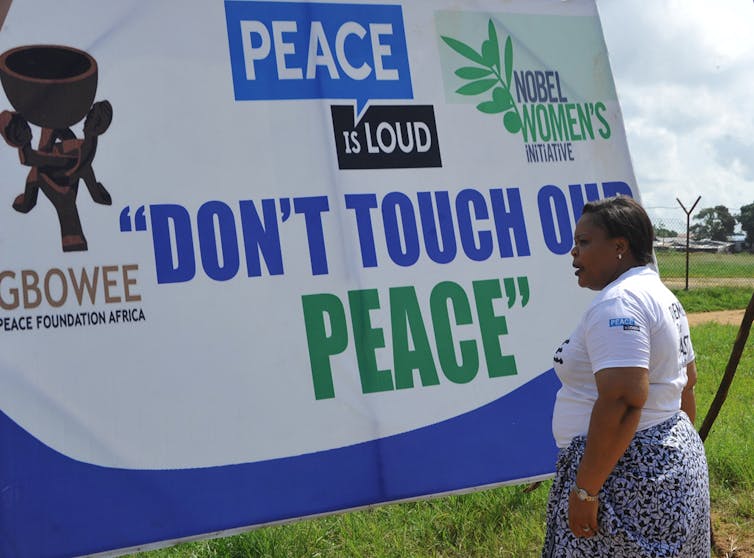
Zoomdosso/AFP via GettyImages
COVID-19 is likely to disrupt ongoing peace processes, worsen existing conflicts and generate new conflicts. But it may also offer opportunities for ceasefires and peace agreements.
The measures taken to contain the spread of the virus are, unfortunately, also affecting the mobility of peacemakers, peacekeepers and peacebuilders.
At least 22 African countries are experiencing political violence. Countries like Nigeria, Cameroon, Somalia, Libya, South Sudan, and DR Congo are experiencing high intensity armed conflicts between armed opposition groups and national governments.
There are peacebuilding efforts in most of the countries that are currently experiencing armed conflict and that have recorded cases of COVID-19. These efforts variously involve the support of international donors, nongovernmental organisations and national governments.
The secretary-general of the United Nations recently called for a unilateral ceasefire in ongoing conflicts.
But achieving a multilateral ceasefire might be difficult. Some warring factions will seize the opportunity to gain an advantage. The challenges are immense. The pandemic could worsen the conflict situation and undermine ongoing peacebuilding efforts.
On the other hand disasters can transform conflict dynamics. Research shows that disasters such as COVID-19 can create opportunities for peace in conflict countries. For one, they can undermine the ability of conflict entrepreneurs to access conflict areas. This reduces incidents of violence.
They can also create the conditions necessary for advancing peacebuilding processes in local communities. To achieve this outcome peacebuilders need to engage with local actors.
The impact of the pandemic
Peace processes supported by the international community are designed to involve multiple stakeholders. Even when described as locally led initiatives they are often guided by internationally recruited professionals.
The global response to COVID-19 in the African countries affected by conflict is hampering the movement of international and national peacebuilders. These professionals have been unable to travel to conflict zones. International organisations have placed movement restrictions on their staff. Many of them have returned to their home countries.
At the national level, restrictions have prevented people from congregating and limited their ability to travel.
Peacebuilding requires sustained efforts towards reconciliation and reintegration. Actors must address the impact of conflict and the causes of conflicts. This process often requires physical meetings and events that are designed to bring conflict actors together towards sustainable peace.
Retreating peacebuilding activities during this period portends a great danger for societies affected by violent conflicts. One likely consequence is that non-state armed groups will use the opportunity to expand their frontiers, thus undermining ongoing peace processes.
It also opens up the possibility of increased mortality in the context of violent conflicts. Hence, it is important that stakeholders adopt mechanisms that will sustain peacebuilding efforts in communities affected by violent conflicts during this pandemic.
Local actors are key
In the face of national lockdowns, one way the momentum can be maintained is through existing local authorities, community peace actors and peace committees. These are common across Africa.
Local actors that are embedded in communities can continue to work on sustaining peace processes even when professional peacebuilders are unable to gain access. For any peace process, what is important is that people keep communication open and sustained even during the pandemic.
And international peacebuilders can continue providing support to their local counterparts. This can be through funding to facilitate activities in local communities.
International peacebuilders can also provide remote mentoring and capacity building. There is technological capacity for peacebuilders to receive coaching in the most remote areas affected by conflict in Africa. International peacebuilders should also remain available to brainstorm with nationals when challenges are encountered.
Local peacebuilders can be enlisted to stop the spread of the pandemic through their existing networks and knowledge of community relations to coordinate preventive responses. These resources can also be used to reinforce the expertise of public health workers in local communities.
Local actors involved in peacebuilding already have experience translating complex messages into local languages. This skill is very relevant in the fight against the pandemic in communities.
Desired outcome
With the right information, local conflict actors can be persuaded to accept the UN’s call for a ceasefire. But this won’t happen unless local actors are involved in crafting the right messages.
Empowering local actors will not only sustain peace processes, but also contribute to the fight against the spread of COVID-19.
To sustain peace, we would need to find new ways of working, by meaningfully including national and local capacities for peace.![]()
Tarila Marclint Ebiede, Research Fellow, KU Leuven
This article is republished from The Conversation under a Creative Commons license. Read the original article.
